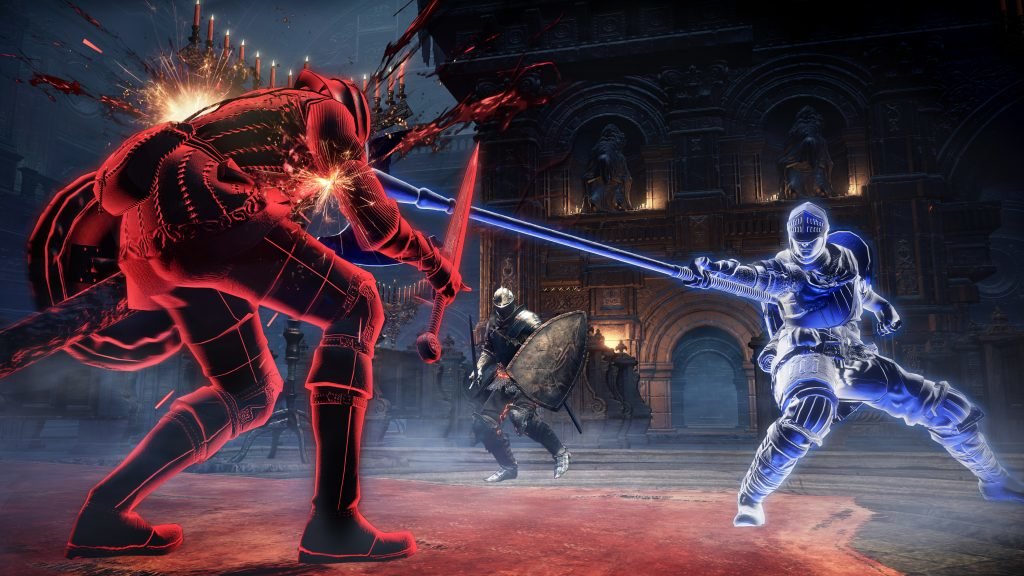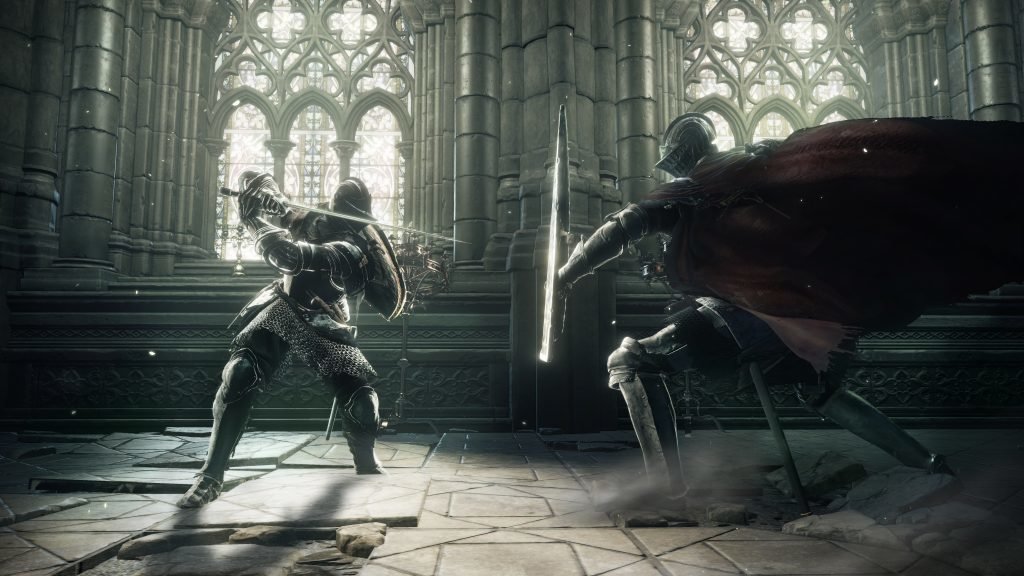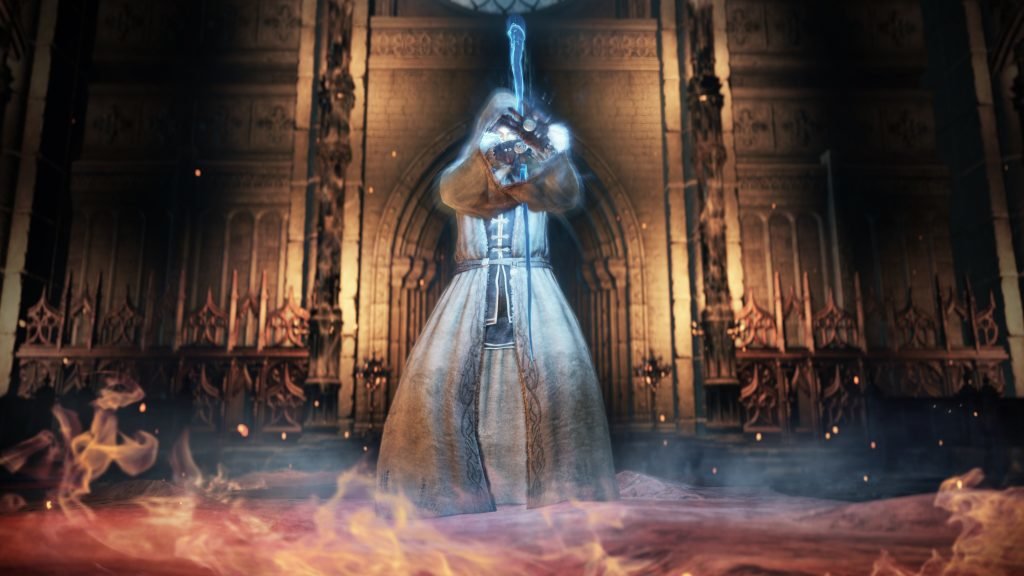Seven years ago, I returned Demon’s Souls to a nearby GameStop after a week or so of playtime, muttering some curses under my breath. A week later I found myself driving home with another copy of the game on the passenger’s seat. I wasn’t about to let the Flamelurker beat me – I wasn’t about to Hollow that easily. My fascination and love for the series hasn’t dissipated since that day – it was bizarre, infectious, and utterly unlike anything I had ever played before.
The Souls series (to include Souls both Dark and Demonic, and Bloodborne) has become quite the cultural touchstone in those seven years. Demon’s Souls was an overwhelming critical success and found a rabid cult following, but it could hardly be described as mainstream; it’s a stark contrast with From Software’s blockbuster marketing spots for Dark Souls III, their emphasis on getting keys to Twitch streamers at the same time as reviewers, and the #brandsynergy blowing up Twitter the week of its release (I’m looking at you, Totino’s). A series that’s largely characterized by inscrutability, punishing combat that requires patience and precision, and intentional narrative ambiguity has captured the mainstream market, influenced reductive games criticism (“It’s the Dark Souls of X!”), and lost a lot of its mystery. That’s not necessarily a bad thing: there’s a joy to familiarity, a critical connection that’s formed between fan and media that makes the latter feel like an old friend. Dark Souls III found itself at a precarious and almost paradoxical position upon its release, then – with an increased frequency of Souls releases and its entrance into the modern lexicon of a wider gaming audience, it faced the challenge of being an appropriate “finale” to the Dark Souls saga while maintaining the mystery which gives it its very character. Dark Souls III threads the needle effortlessly. While familiarity creeps around the edges of Dark Souls III, and it’s a perfect time to lay the series to rest before it becomes stale, there’s both enough subversion of expectations and new systems in place to keep those familiar with the series on their toes and narrative closure to immensely satisfy anyone up on their lore. Dark Souls III is the best finale anyone could have hoped for, and full of enough complexity and polish to keep a community thriving around its release both online and offline for the foreseeable future.
It’s difficult to talk about the story of a Souls game, both because of its vagueness and because delineating spoilers and non-spoilers can be difficult. Dark Souls III is a peculiar case for Souls storytelling, and particularly susceptible to “being spoiled” in a traditional sense (don’t worry, I won’t). Where previous games have been disparately connected and often presented more questions than answers, Dark Souls III is explicit in its relation to other entries and ties off many longstanding loose story threads – I think it’s the only game in the series where a single sentence could give enough context and information to be considered a “spoiler.” While this change can initially feel a bit alien, it can be contextualized by realizing Dark Souls II’s relation to the rest of the series. As From Soft’s President/Souls Game Director Hidetaka Miyazaki was overseeing production of Bloodborne, Dark Souls II was developed by a separate team. Dark Souls II can best be described as loosely related to the first game; while there’s certainly a narrative connection, it’s fairly obscured and most similarities are in the mechanics. I think without this precedent, the direct-sequel nature of Dark Souls III would feel somewhat less surprising. I wouldn’t go so far as to call Dark Souls III the “true sequel” to Dark Souls, but it shares an atmosphere and lore basis with the original game far more than its sequel. Miyazaki’s presence can be felt, and with III his farewell to the series, its unique relationship with the original game makes sense. Dark Souls III‘s directness could easily have stripped the game of the series’ longstanding joy of interpreting a new and foreign world, and to some degree does – but that loss of discovery is replaced with a new, and at least equal joy, of resolution. While I’ve heard many of the nods Dark Souls III makes to previous titles called “fan-service,” I think to do so cheapens how elegantly and respectfully the game revisits meaningful pillars of the series.
In this instance I actually feel fine dancing around plot in a review; I believe that the most interesting conversations in discussing the “story” of Dark Souls have never arisen out of specific plot points. The fulcrum for the inspired theorizing and analysis that swarms the Souls community at large has always been from taking context from the atmosphere, level design, and item descriptions and using these clues to invent cannon about the intentional holes left for the audience to ponder. If we were to qualify a successful Souls “story” through providing opportunity for discussion, Dark Souls III succeeds immensely in its newfound appeal to an existing knowledge base. III is no less an elusive beast than its predecessors, and by laying more of its cards on the table, the rush to answer what questions remain only feels more urgent. III even questions whether “answered” mysteries were ever truly answered in a constant stream of presenting just enough information for the player to reevaluate their convictions on the mechanics of this universe.
The true brilliance of this model lies in its tie to how the player will actually interface with the game on a moment-to-moment basis, in terms of gameplay. The game revisits key Souls tropes (there’s a boulder that comes down a staircase at you, etc.) before turning each one on its head, flashing a middle finger at the player who thinks they know all of the tricks by now. In both mechanical/gameplay-based storytelling and conventional writing-based narrative, familiarity allows Dark Souls III access to an all-new arsenal of tricks that prey upon the hubris of the player. In this way, the game’s leverage of a intimate player-base is the smartest evolution of the guiding principle of Souls the series could have made. Dark Souls has always been a process of socializing the player to succeed in an unfamiliar narrative and mechanical framework that demands patience, planning, and precision – III is a resocialization process, slowly teaching a new set of laws in an existing framework.
The pace of the action has slowed significantly from Bloodborne, but that game’s influence hangs large on this product. Bloodborne, too, was a subversion of expectations. While no changes to III are as drastic as removing shields or completely transplanting the player in a different universe, the same core of reinventing existing systems lives on. The addition of weapon skills and the Focus Points system is a brilliant realization of the flexibility of build the series has always sought to provide. By providing a clear-cut decision for the player to make between a “glass-cannon” or “tank” build (by choosing how many Estus flasks you want to restore HP, and how many you want to restore FP), magic and dex builds enter the fray as being, for the first time, as viable in both PvE and PvP as an all-strength build. It’s a refinement that feels both logical and natural, how things should have worked all along. PvP has always been core to the Souls experience for a large portion of the audience, and returning from Bloodborne‘s limited weapon choices back to the myriad weapons expected of a Souls game (with the return of fan favorites and a heap of new toys to play with) also helps to bolster the viability of a long-term online community flourishing. I could go on to detail Covenant overhauls, the addition of a full Red Eye orb, and other such balance tweaks, but I think a more effective summary of my feelings on the matter is anecdotal: I’ve never been a PvP fiend in these games, but the first thing I did after I beat the game was to go back to a hard area and invade some poor players. Sorry, fellow players – it’s not pure sadism, I just don’t want to stop playing.
That desire to continue inhabiting the space of Dark Souls III is surprising not only in the face of approaching Souls fatigue, but when considering how damn oppressive the atmosphere of the game is. Gone is the sunshine and wonder of Dark Souls II, a change I actually liked in that game – instead, Dark Souls III operates in shades of misery and darkness. Prior to the game’s release, I talked to Mike Chang, Global Brand Manager at Bandai Namco, about the changes to the series. An oft-repeated line in the interview was that “Dark Souls III is the darkest game in the series yet.” Boy, he wasn’t kidding. It’s a different kind of dark than the straight-up horror of Bloodborne, but much of the game is cut from a similar cloth of Demons Souls’ Tower of Latria or Dark Souls’ Tomb of the Giants: atmospherically dark as hell, narratively dark as hell, and quite literally dark as hell. Thankfully, with the help of some jolly online co-operation and plenty of characteristic subtle goofs (think Xanthous crown), III manages to stop short of the overwhelming oppressiveness of a Pathologic and toes the line of abject misery while managing to be a world one wants to continue to explore and spend time in. It’s a deft balance that’s struck, and the exploration of landmark locations in an – often quite literal – different light cultivates a tight juxtaposition of alienation and fascination.
The question remains of whether series newcomers or those who jumped in with Bloodborne will find as much satisfaction. I posit that this is largely situational. In regards to newcomers, this is definitively the ultimate realization of the mechanics of the franchise, and therefore more eminently playable than its successors. However, those turned off by the core mechanics of the series or its difficulty will find little here to change their mind. For those coming straight from Bloodborne, it’s highly dependent on whether one’s joy in that game came from its specific lore and speed, or a greater respect of its core mechanics and storytelling techniques. In both cases there is a concern about not knowing the story and history of Dark Souls. While I think that much of what makes Dark Souls III great comes from how it iterates on its predecessors, and would recommend at least a quick read of a lore primer, the game stands well enough alone as a complete package for the series newcomer to keep up just fine.
I won’t spend much too much time on the technical performance of the game, as Digital Foundry already has done some very in-depth analysis of version performance, but I’ll corroborate the claims of the Xbox One version of the game suffering from some framerate issues (as well as a lowered resolution) compared to the PS4 and PC versions. PC is undoubtedly the way to go if you have a solid rig and friends playing on the platform, but with reports of game-breaking crashes on the PC going around, I’d recommend some amount of consumer caution in an early purchase of the PC version prior to patching. Otherwise, performance was quite playable on the console versions of the game for me, with the exception of some perceived stuttering due to irregular ordering of frames native to the Bloodborne engine, which this game also runs on.
It will take some time to tell, but Dark Souls III might well supplant the original Dark Souls for me as being the best game in the series and one of my favorite games of all time. While inherently some amount of wonder and discovery is dampened due to the Souls series’ ubiquity, Dark Souls III has no shortage of those qualities and masterfully harnesses its own cultural relevance into a tangible positive for the product. I can’t overstate my excitement to see the Souls community theorize on the lore, watch the PvP community grow and learn the tricks unique to this game, and see what From Soft and Mr. Miyazaki work on in the future. I can only hope it will be as inspired as the send-off they gave to Souls.
This review is based off a review copy of Dark Souls III provided and developed by From Software for the PlayStation 4.
- Inspired Mechanical Changes
- Constant Subversion of Expectations
- A Perfect Close to a Legendary Series
- Some Performance Issues
- Minor Diminishing Returns




